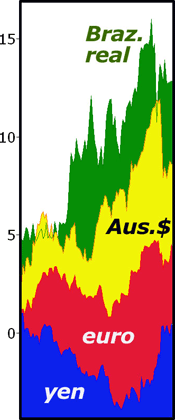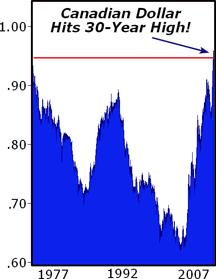United States Day of Reckoning!
Stock-Markets / Financial Crash Aug 06, 2007 - 09:55 AM GMTLast week, I sent you a crash alert on Monday and then sent it to you again on Saturday. If you've seen it and you've taken the five protective steps I recommended, you should be in good shape. If not, before you start on this morning's message, I think you should go back and read my crash alert now .
— Martin Weiss
I was born in New York but raised in Brazil.
Elisabeth was born in Brazil but has spent most of her adult life in the U.S.
When we first met, she was 13, and I was 17. She was going to high school in Piracicaba, the heart of sugar cane country in the interior of São Paulo state. And so was I.
Six years later, we got married, moved to New York and went to college together.
Another 11 years passed in a flash, and we went to live in Japan, where I got a Fulbright Fellowship for my doctoral dissertation about Kabutocho, Tokyo's financial community.
Thanks mostly to our host family in Tokyo, the Kondos, it was a wonderful experience.
And now, many years later, Mrs. Kondo's daughter and son-in-law, the Nishimuras, along with their 4-year-old Nanako, just came to spend a few days with us while they looked for a new home here in northern Palm Beach County.
Nanako is the one who seems to have taken best advantage of the visit. She played with Vida, our niece's puppy. She enjoyed the special read-on-your-own books I made for Anthony when he was her age. She even attended summer camp at the Weiss School, one of the main attractions for her education-minded parents to move to our area.
But I also took advantage of the visit to talk — and meditate — about the three countries represented in our household last week: the United States, Brazil and Japan.
Here are my thoughts on each …
The United States Is Suffering From a Traumatic Housing Bust That Is Just Starting to Unfold
In this area, for example, the asking prices for the middle-class homes that the Nishimuras looked went to see have plunged about 20% from the recent peak, with no end to the decline in sight.
Their real estate agent tried to persuade them that, with prices down so sharply, "now's THE time to buy."
But with so many homes sitting empty for so long, owners are desperate to cover their costs any way they can. So rents in some of the nicest neighborhoods are also very cheap, and the Nishimuras made what I believe to be the right decision: Rent now. Buy later!
They watch the news. They see the stock market going down and the reasons why. So they can easily connect the dots:
- The housing bust is causing a mortgage meltdown …
- The mortgage meltdown is creating an acute, nationwide credit crunch, and …
- The credit crunch is so bad it's beginning to impact the broader economy, including the job markets, which greatly disappointed economists last week.
"If people can't borrow to buy homes," asks Mr. Nishimura, "where are the buyers going to come from? And if so many people are selling with no one buying, what makes them think this could be a bottom?"
Their conclusion: The U.S. is still a great place to live. But right now, it's not exactly a good place to invest — especially in real estate.
In contrast …
Brazil Is in the First Phase Of an Economic Renaissance
Brazil's real estate prices, propelled by a growing economy and an influx of foreign money, are rising sharply and steadily.
That's true in the interior, where Elisabeth's sister has gotten higher and higher bids for an undeveloped lot. And it's true on the coast, where our beach condo has appreciated very nicely in the last couple of years.
Meanwhile …
Brazil's once-huge foreign debts have been paid off.
Its trade deficit of yesteryear has been transformed into a massive trade surplus .
And its vast natural resources are in tremendous demand, selling in ever greater amounts, fetching ever higher prices.
 |
| Many of the highest-yielding sugar cane varieties used to produce ethanol in Brazil are developed at the Escola Superior de Agricultura "Luiz de Queiroz" (ESALQ) in my adopted home town of Piracicaba. The sprawling campus, spread out over 9,500 acres, has one of the world's most advanced genetics research centers for agriculture. |
Brazil is also leading the worldwide ethanol revolution.
In fact, thanks in part to high-yielding cane varieties developed in the same town where Elisabeth and I went to high school, the ethanol industry is booming.
Many people in North America don't understand, or don't believe in, the ethanol revolution. But I think that's mostly because their views are molded by the ethanol industry in the U.S.
The difference is that America's ethanol, made from corn, takes too much energy to produce. It drives up the price of food and feed. It requires never-ending government subsidies.
Brazil's ethanol, made from sugar cane, is another matter entirely. It's clean. It's cheap. And it has reduced Brazil's dependence on imported oil to zero.
Suddenly, the global surge in energy costs, which used to be a huge drain on Brazil's economy, is now a great boon to its growth.
At the same time …
Japan Is Now Enjoying Its Most Enduring Growth Since World War II
Japan's trade and investments with China are booming.
Japan's real estate values are moving sharply higher, with land prices surging 8.6% last year alone, five times more than in 2005.
Its economic expansion, now in its 66th month, is the country's longest in SIXTY years!
But unlike the late 1980s, when Japan's economic boom created one of the greatest bubbles of all time, this time around, the growth is steady, healthy, and building a solid base.
Most important, especially for Japanese youth, is the fact that their many hard years dedicated to education are finally paying off: Japan's jobless rate just fell to its lowest level in more than nine years, and major companies are snatching up young recruits well before they finish college.
A 21-year-old friend of the Nishimuras in Tokyo, for example, is still months away from her bachelor's degree, and already she has a job lined up with a major industrial giant.
Nanako's older cousin, in a different college, was getting a bit anxious because his only job offers were from smaller companies, which he turned down. Now, though, it looks like he may also get the job of his dreams months before graduating.
These are the signs of vibrant economies: Japan, coming out of 11 years of start-and-stop recession; Brazil, emerging from decades of doldrums.
Both have built a solid platform for expansion — precisely the opposite of what we see in the United States, where we are just beginning to suffer the consequences of one of the greatest speculative bubbles of all time.
This is one of the main reasons why …
Foreign Currencies Like the Brazilian Real And the Japanese Yen Have Been Rising … But the U.S. Dollar Has Been Plunging!

So far this year, the Brazilian real has been the strongest among the 16 widely traded currencies tracked by Bloomberg.
The Australian dollar has also been moving sharply higher, easily surpassing the euro, despite the euro's all-time highs reached last month.
The Japanese yen, in contrast, started the year with a decline, but its slide was mostly contrived: The Japanese government, anxious to keep its exports cheap, did everything in its power to keep the yen down.
But now, with still more confirmation of Japan's robust economy, the Bank of Japan has little choice but to let the Japanese yen rise. And very soon, it may have to raise its short-term interest rates, giving the yen an even bigger boost.
When that happens, it could be like ripping the lid off a pressure cooker, unleashing an explosion in the yen.
Indeed, the yen has been forcefully depressed for so long, it will have to surge by leaps in bounds just to catch up with the rising euro — not to mention catching up with other major currencies, like the Australian dollar or the Brazilian real, both which have been going up even faster.
This is no trivial matter. Nor is it a sideshow to the drama unfolding in the U.S. credit markets. Quite to the contrary, it's of vital importance, and you must not underestimate it.
Remember:
The U.S. Economy Is Addicted To Huge Amounts of Money From Countries Like Japan!
If it hadn't been for the big influx of capital from Japan, Germany, China and virtually every major nation on the planet …
The U.S. government would never have been able to finance its budget deficits without paying much higher interest rates …
American home buyers would never have been able to get so many mortgages on such liberal terms …
American consumers would not have been able to exhaust their savings and spend so much …
American corporations would not have been able to rack up nearly as much in sales or profits and …
The entire U.S. economy would never have come this far this fast.
Year after year, experts warned about America's over-reliance on foreign money. Year after year, fewer people paid attention, while more clamored for their share — to live in bigger homes, ride in bigger cars, take longer vacations.
Now, however …
The Day of Reckoning is Here
Now, the housing bubble nurtured by foreign money has burst.
Now, the cheap and easy credit, largely financed by foreign money, is disappearing.
Now, the foreign money is not coming any more … or it's actually leaving.

Now, the Fed's major trade-weighted index of the dollar has plunged to its lowest level in its history; and foreign currencies are surging to their highest levels in decades.
The euro. The British pound. The Australian and New Zealand dollars!
Even the Canadian, long thought of as "the weaker dollar in North America," has just surged to a 30-year high.
Corporate bond prices are tumbling, even on higher quality issues.
The S&P 500 Index has begun to break down, sinking through a key trendline in its chart with Friday's 39-point plunge.
For our nation, it's too soon to say what the final outcome will be. But for you, I can say flatly that the consequences of complacency could be catastrophic.
Follow the immediate five steps I outlined for you one week ago … and sent you again this past Saturday.
Look for every opportunity to move your money — from investments that are most vulnerable to the mortgage meltdown to those that are most likely to benefit from continuing global growth.
And …
Think Seriously about Investing in The World's Strongest Currencies
In years past, that was often difficult and could involve taking large risks.
But today, with ETFs dedicated to each of the major world currencies — including the Australian dollar (FXA) and Japanese yen (FXY) — you can buy currencies just like you buy any stock or other ETFs.
As with any investment, there's a risk of loss if the foreign currency goes down. But aside for short-term corrections, I feel that's unlikely.
The mortgage meltdown is not just a blip your radar screen.
The growth in countries like Brazil and Japan is not a fluke.
The U.S. dollar is not falling — and foreign currencies are not rising — on a whim.
Don't ignore them. Don't delay protective action — for yourself and your family.
Good luck and God bless!
By Martin Weiss
This investment news is brought to you by Money and Markets . Money and Markets is a free daily investment newsletter from Martin D. Weiss and Weiss Research analysts offering the latest investing news and financial insights for the stock market, including tips and advice on investing in gold, energy and oil. Dr. Weiss is a leader in the fields of investing, interest rates, financial safety and economic forecasting. To view archives or subscribe, visit http://www.moneyandmarkets.com .
Money and Markets Archive |
© 2005-2022 http://www.MarketOracle.co.uk - The Market Oracle is a FREE Daily Financial Markets Analysis & Forecasting online publication.



